The Papa and the Baby. Papa is dead but the Baby is still a wolf.
While much of the Nation focused on Tucson and MLK memorials, this weekend the situation in Haiti became even more precarious.
I realize that it is difficult to get people to focus on Haiti. But I am going to try again to discuss why we as American citizens bear part of the responsibility for this bloated wolf who has fed on the lifeblood of Haitians and now returns to the scene of his earlier crimes to perhaps wreak havoc yet again.
I will ask yet again for you to mobilize the power of your phone calls and emails to protest.
Not asking for money. Just outrage.
We are very good at outrage here. Let’s put it to good purpose.
Few of us on the American left protested the murder, torture and assassinations taking place in Haiti during the reigns of the Duvalier’s.
Too easy to read headlines, shake our heads and move on to some other outrage, or our own personal commitment to a specific issue.
Haiti, has for the most part been ignored. Even now, only a few days after the anniversary of the earthquake last year, it is hard to keep Haiti on the minds of our citizenry.
Though we do speak out here about torture, it is not often in memorium for those who died under the bloodstained hands of Duvalier père et fils.
The dead and imprisoned remain faceless statistics., mentioned in passing as the media mentions the brutal reign of the Duvaliers.
Forgotten. Unmourned except by family, friends and a small band of activists here in the US who have little power to influence US public opinion.
I cannot paste copyrighted material here. So I will ask you to please take a moment and click on THIS LINK.
Visit the photo gallery of the tortured, dead and missing.
Put faces, occupations and ages to the numbers.
And understand why the return of Baby Doc cannot be tolerated.
This website, was constructed in love and pain by Patrick Lemoine, a Haitian survivor of brutal imprisonment, who now lives in the US. Family and friends of those murdered and tortured have contributed the information.
Here is his bio:
Patrick Lemoine, the middle child of a family of five children, spent his childhood in the vicinity of a slum called Bois-de-Chêne located in the center of Port-au-Prince near the National Palace. Growing up in that neighborhood, he experienced first-hand the social injustice that is so prevalent in Haiti. He attended Catholic and other private schools until he completed his secondary education. When Patrick was 19, he lost his father Raoul, who died at the age of 54 in 1964. Two years later, his mother Fernande immigrated to the United States with her children. Patrick decided to go back to his homeland a year later and worked at the International Airport of Port-au-Prince for a couple of years. In 1969 he returned for a short period of time to the United States. He eventually landed back in Haiti where he started a family and managed a small manufacturing company until his arrest at the end of 1971, shortly after Baby Doc’s ascent to power.
By God’s grace, Patrick survived his six years of torturous imprisonment, four of which were spent in Fort-Dimanche,and was released in 1977 – thanks to the Human Rights policy of the Carter administration -, then was expelled from the country. Patrick finally settled in the United States where he still resides. He started a new family, graduated from Teterboro School of Aeronautics, and began a career in aviation technology. He is currently a member of the management team for an airline company.
Patrick spent many years working intermittently on his memoirs. In 1996 his dream was realized with the release of the French version of his testimonial, Fort-Dimanche, Fort-la-Mort. In 1999 he published the revised and augmented English version of the original book, Fort-Dimanche-Dungeon of Death, to immortalize the memory of his comrades who perished under the infernal regime of the Duvaliers.
I lived near Haitian exiles who fled Duvalier and his Ton Ton Macoutes when I was a teenager in Queens NY. I dated a Haitian. His mother was afraid to ever have the blinds open in their modest home…living in fear that the long hand of death and the Ton Ton Macoute would find them in Ozone Park.
painting by Gèrard Bruny
The Haitians nicknamed this warlord-led goon squad the “Tonton Macoutes,” after the Haitian Creole mythology Tonton Macoute (Uncle Gunnysack) boogeyman who kidnaps and punishes obstreperous kids by snaring them in a gunnysack (Macoute) and carrying them off to be consumed at breakfast.
I admire Patrick Lemoine for having the courage to speak out.
Exiled Haitian activist speaks against corrupt government
Lemoine was born in Haiti in 1945 and arrested by the Haitian government in 1971. As a well-educated Haitian citizen, he knew better than to blindly follow the rule of the nation’s dictatorial government. Lemoine was about to celebrate his first wedding anniversary when he discovered that a friend had been arrested. He inquired about the fate of his friend and found that he himself was wanted by the government. According to Lemoine, such unexplained arrests were made with little or no provocation. “Young and old, rich and poor, men and women, literate and illiterate were put in prison,” he said. “We lived in fear for our lives. No one knew what would happen from day to day. I could ask, ‘Why me?’ And then again, ‘Why not me?'”
In his first prison, Lemoine lived in a 6-by-6-foot cell and was deprived of all contact with the outside world. During a rare encounter with another prisoner, he discovered that President Nixon had just been re-elected. Lemoine knew from this that he would be in prison for at least another four years, because Nixon was unsympathetic to the Haitians’ cause. In 1974, Lemoine was transferred to Fort-Dimanche, commonly known as the “Dungeon of Death.” “Those who entered were not expected to come out alive,” Lemoine said. To illustrate the atrocious conditions in which he existed, Lemoine asked the audience to “imagine a cell, 9 feet wide by 10 feet long, and 12 feet high. There was a mat on the floor for a bed and a 5-gallon bucket to be used as a john, which was overflowing with urine and feces. There were usually 15 to 17, even up to 30 cellmates living here at a time.”
No medical care was given to the prisoners, and those with diseases were not separated from the rest of the group. Urine became part of their everyday lives. It was used to wash bodies, clothin
g and sometimes satisfied the final wish of a dying cellmate for a last drink of water. Lemoine managed to survive these conditions because of his son, who was 29 days old when Lemoine was taken into captivity. “I didn’t want to give the government the satisfaction,” he said. “I wanted to be there to raise my son.” However, since his exile to the United States in 1977, Lemoine has had little contact with the son he left behind.
Ton-Ton Macoute
In case you question Lemoine’s description, and since you may not get an opportunity to read his excellent but disturbing book which is out of print in English, here is an old NY Times story from 1994 which may give you pause.
I doubt the editors at the Times allowed the use of the analogy to Auschwitz lightly.
PORT-AU-PRINCE, Haiti, Sept. 30 — The young American second lieutenant said he had not been aware of an evil such as Fort Dimanche. The torture and killing that went on for three decades in the crumbling old prison, and the mass grave that rises from the weeds outside the walls, eclipse anything he has ever known.
Now, Lieut. Jeff Shuck, 24, of Memphis, is the master of one of the most foreboding, horrifying places in Haiti. If I had my way,” he said as his combat boots stirred up the dust along the long rows of empty cells, “I would blow the whole damn thing to little pieces.”
Lieutenant Shuck is in command of 25 soldiers whose job is to secure and occupy a fort that is to Haitians what Auschwitz is to Jews, a place so hated that most Haitians would not come near it, afraid of the spirits of the dead who disappeared inside the wrought-iron gates. For as long as most Haitians can remember, Fort Dimanche has been at the epicenter of their oppression. Built in the 1920’s, it became under Francois Duvalier, and later under his son Jean-Claude, a political prison where men were beaten, electrocuted, dismembered, blinded and castrated. An estimated 3,000 people were locked inside and were never seen alive again. Others, ruined mentally and physically, were released after months or years to show the population what would happen to enemies of the state.
Rolande Michell was imprisoned here for six months in the late 1970’s, after the Tontons Macoute, the secret police, branded him a Communist. Mr. Michell is 51 but looks 70, with a deeply lined face that is misshapen, he said, from a beating with a broom handle. He believes he was set free as a warning to others. “It is a bad place,” said Mr. Michell. “They starved me, but I was fortunate. They starved men to death. They beat men to death. I saw them cut into the muscle of one man’s leg so he would limp. You could hear men screaming all the time.
“They made me promise to be faithful to Duvalier. I promised so they would not kill me.” In 1986, after riots forced Jean-Claude Duvalier into exile, part of the fort was razed by angry mobs. But the city government in Port-au-Prince decided not to destroy the structure, as many wanted, but to turn the site into a historical monument, like the death camps that were preserved after World War II.
Sadly Fort Dimanche was not destroyed then, and it was returned to use as a prison after the removal of Aristide. This time including a prison for children.
Ezili Dantò reported:
Thus, from 2004 through to today, the brutal Western-sponsored Haitian nightmare continues, goes virtually un-reported. The world doesn’t seem to want to know that under Bush-the-son’s Haiti-regime-change, starting with Gerard Latortue’s Boca Raton government held up with UN occupation forces and the embedded corporate media’s indifference and outright support, Haiti has been turned into a (penal) colony for Haitian children, for Haiti’s people.
In fact, Duvalier’s bloody Fort Dimanche dungeon-of-death are back in business with a children’s prison in Haiti for the first time in Haitian history. Raoul Cedras, Toto Constant, Guy Phillip, the Duvaliers and Gerald Latortue, all were thugs and assassins financed and held up and kept in power in Haiti, over the protest of the majority of Haitians, by the Western powers led by the US.
Nothing is as frightening as the night facing Haiti’s children under this current foreign occupation. When the US marines where in Haiti back in 1915-34, they practically brought back slavery with the corvee. Today, under the UN, Duvalier’s infamous Fort Dimanche prison, the “dungeon of death,” is back in business.
The Washington Post had a photo essay, visually documenting this story.
So often in the classes I teach on the history of the Caribbean, my students have a hard time understanding how Haiti (pre and post earthquake) could be in the situation it is, and answering those questions requires delving into a past which has all too much influence on the present.
Here are some relevant excepts from:
Timeline – the History of the Duvalier’s in Haiti
1957 – With army backing, Duvalier is elected president for a six year term on 22 September. He promises to end the privileges of the mulatto elite and bring political and economic power to the black masses. However, the political climate remains unstable.
1958 – After an unsuccessful attempt to overthrow him in June, Duvalier takes steps to consolidate his position. Senior officers in the military are replaced with younger men, the size of the army is reduced, the military academy is closed, political parties are banned and curfews are introduced.
Duvalier also takes control of the Presidential Guard, turning it into the army’s elite unit.
With chief aide Clément Barbot, he organises the Volontaires de la Sécurité Nationale (Volunteers for National Security), or Tonton Macoutes (Bogeymen), a private militia estimated to number 9,000-15,000 that will be used to terrorise and murder opponents.
Recruits are drawn initially from the slums of Port-au-Prince. They receive no salary, relying instead on protection rackets and crime to support themselves. The Tonton Macoutes act as Duvalier’s front-line security force and as a balance to the political power of the armed forces. Their chain of command reaches directly to the Presidential Palace.
ton-ton macoute with machete
On 12 August a group of Cuban guerrillas and Haitian exiles lands on the southern most tip of the country in another attempt to remove Duvalier. They are defeated by the Haitian Army, with the aid of US marines.
1961 – Duvalier manipulates elections to have his term extended to 1967, winning the vote with an official tally of 1,320,748 votes to zero.
“Latin America has witnessed many fraudulent elections,” the ‘New York Times’ reports on 13 May, “But none will have been more outrageous than the one which has just taken place in Haiti.”
Following the election, the US raises concerns
about the misappropriation of aid money by Duvalier. In 1962 US aid is suspended. The following year diplomatic relations are also suspended and the US ambassador withdrawn.
We have the tools to help
editorial cartoon Dave Brown – The Independent
Woven through this history and Haiti’s present predicament we will always find the hand of the United States. It is up to us to challenge current US policies. Though we are ostensibly there to assist with organizing aid and re-building efforts, given our history with Haiti is there any reason for some of us not to question what the US role might be in this latest development?
History – US interventions/invasions of Haiti
Haiti 1891 Troops Black workers revolt on U.S.-claimed Navassa Island defeated
Haiti 1914-34 Troops, bombing 19-year occupation after revolts
Haiti 1994-95 Troops, naval Blockade against military government; troops restore President Aristide to office three years after coup
Haiti 2004- Troops Removal of democratically elected President Aristide; troops occupy country
Key in all this history is the 19 year occupation of Haiti by the US.
For those of you who are interested in learning more, I’d like to suggest this book.
The United States Occupation of Haiti, 1915-1934
The NY Times Review said .” From Schmidt we get the full details . . . of the brutal racist practices inflicted on the Haitians for nearly all of the nineteen-year American presence in the country.”
Marie-Josée Mont-Reynaud’s paper on this period is available online.
The Failure of the American Occupation of Haiti, 1915-1934
She too points to the racism that went hand in hand with the US dealings in hemispheric hegemony.
“Primitive African Peasants”
American officials who entered Haiti in 1915 came with preconceived ideas about the African race and its capacity for self-government. In addition to skewed racial perceptions, the Americans also arrived believing that their role was, among other things, to teach a recalcitrant child nation to behave like a mature, democratic nation. Americans believed the Haitians to be “primitive African peasants” to whom they had a “duty to develop their political capacity,” and whom they would teach to govern so that Haiti would “be fit to enter the family of nations.” Smedley Butler, Colonel at the time, explained how the Marines saw themselves as “the trustees of a huge estate that belonged to minors”. With such a mind-set, the United States “set out to spread the blessings of a stable government of law” in Haiti.
Under the terms of the treaty, the Americans controlled everything in Haiti, except education and the courts. These conditions made the Haitian government a phantom authority without any real power of its own. Laws needed the approval of the American High Commissioner, who effectively blocked many Haitian initiatives from being enacted. Members of the Union Patriotique, including Dantes Bellegarde and Pierre Hudicourt, criticized this state of affairs. According Bellegarde, “nothing would be undertaken in Haiti, the credit for which could not be wholly attributed to the Americans.” With the treasury in American hands, the Haitian government did not even have discretion over the use of public funds. Dartiguenave was “no more than a toy in the hands of … the High Commissioner who has absolute omnipotence.” High Commissioner and Brigadier General of the Navy, John J. Russell kept a troop of Marines housed behind the Presidential Palace. The American military was no mere presence; it reflected the strong union of politics and power in the American Occupation of Haiti.
Non Participatory Democracy
Under the Occupation, Haitians were not able to be actively involved in government as would be expected in a democracy. Haitians were barred from the higher offices in the administration, which were filled with Americans. American officials such as the Financial Advisor had much more power than was outlined in the treaty; instead of merely guiding the Haitian government in developing successfully, they had “exceeded their role as counselors and … transformed themselves into veritable dictators.” With the Haitian Senate dissolved in 1916, the country was essentially left in the hands of Dartiguenave and a handful of cabinet members, who were heavily influenced by American interests. Thus the Haitian masses did not benefit from representation, nor were they able to participate in government through elections, which were restricted by Marines. In one instance, the Marines closed polls on election day, to the protest of the voters who tried to enter anyways, and the Marines resorted to violence to disperse the crowd. Dantes Bellegarde protested this exclusion of Haitians from the politics of their own country, exclaiming “What a way to teach us self control, by taking from us all control of our affairs!” How could the Haitians be taught the principles of a democratic government if they were not participating in its administration?
Sounds familiar doesn’t it?
Our neighbor to the North has spoken out about the return of Baby Doc.
Canada condemns return of ‘Baby Doc ‘ to Haiti
MONTREAL – The Canadian government is condemning the sudden return to Haiti of an old tyrant, fearing Jean-Claude (Baby Doc) Duvalier could further destabilize the already fragile country.It joins this country’s Haitian community and a litany of international observers in expressing concern about the former president’s return to the country where he was chased from power in 1986.
In a terse statement issued Monday, Prime Minister Stephen Harper’s office referred to Duvalier as a dictator. “Our government is concerned that Haiti’s former dictator has returned at a critical time in Haiti’s democratic process,” said Harper spokesman Dimitri Soudas. “We urge all parties to respect Haiti’s constitution, and the democracy, human rights and rule of law it represents.”
…
Thousands more were forced into exile, many fleeing to Montreal, now home to one of the largest Haitian diasporas in the world. Duvalier’s abrupt reappearance on the Haitian political scene has sent tremors of anxiety and anger rippling through the community. Among those expressing shock Monday was Canada’s former governor general. Michaelle Jean has in the past described being traumatized by images of blood-soaked walls during a childhood visit to a police station where her father was tortured.
At the time I am writing this – I am still waiting for an official US government response.
So far there are only reports of remarks from an unnamed S
tate Department official:
Duvalier’s return to Haiti worries U.S.
The Obama administration expressed surprise and worry Monday at former dictator Jean-Claude Duvalier’s sudden reappearance in Haiti, the country he fled 25 years ago with help from the United States.
In a brief statement issued nearly 24 hours after Duvalier arrived in Haiti from France, the State Department said it was worried that his presence could further upset Haiti’s fragile political climate. It called his presence in Haiti a “visit,” though Duvalier hasn’t said publicly whether his return is temporary.
“We are surprised at the timing of this visit, given the continuing turmoil surrounding the November 28, 2010, elections as well as the unpredictable impact of Duvalier’s return on Haiti’s political situation,” the statement said. “Our focus continues to be a resolution of Haiti’s elections crisis that reflects the will of the Haitian people and that ensures reconstruction and humanitarian efforts proceed unabated.”
The statement urged “all political actors and their supporters to remain calm and to work peacefully toward a prosperous future for Haiti
Amnesty International, and other Human Rights organizations have called for the arrest of Baby Doc.
Jean-Claude Duvalier must face justice for Haiti rights violations
Haitian Americans in communities in New York, Boston and in Florida are raising an outcry.
Veronique Fleurime Jean Juste, left, and Jean Pierre hold anti-Jean-Claude ‘Baby Doc’ Duvalier and pro-Jean-Bertrand Aristide signs in the offices of the Haitian political group Veye Yo in Miami’s Little Haiti neighborhood, Monday, Jan. 17, 2011. Some Haitians in Miami protested the return of an ousted dictator to their Caribbean homeland and called for his arrest on Monday, while many others simply tried to make sense of his sudden appearance. (AP / Wilfredo Lee)
NEWS UPDATE: As I was editing this today I heard a news report that Baby Doc is being questioned by authorities in Haiti.
Haitian police escort ‘Baby Doc’ Duvalier from hotel
Haitian police escorted former dictator Jean-Claude (Baby Doc) Duvalier on Tuesday from the hotel in Port-au-Prince where he had been staying since his surprise return from exile on Sunday.
Mr. Duvalier, 59, was taken by police from his room after a senior government official told Reuters he would be questioned by judicial authorities to determine whether he should be prosecuted for stealing from the treasury during his rule.
Will update in comments as more news comes in.
Please contact the State Department, the White House, and Bill Clinton to demand that the US Government should apply pressure to the Haitian government (such as it is) to prosecute Duvalier for his crimes.
Cross posted from Black Kos
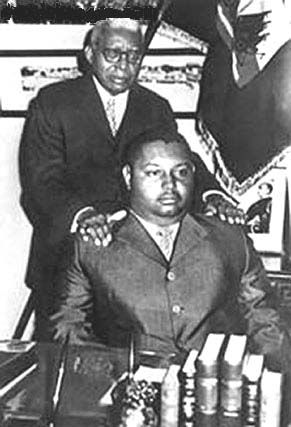
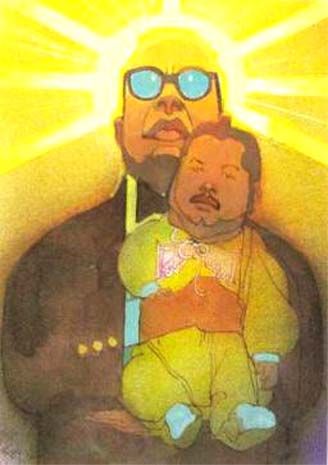
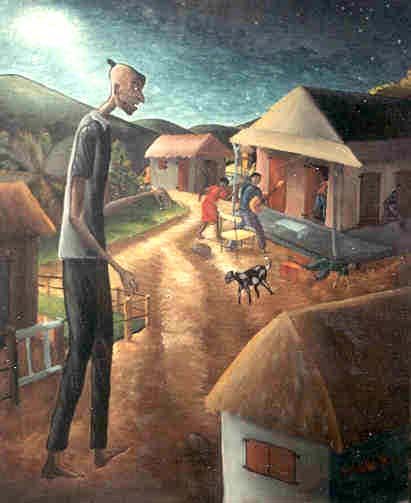
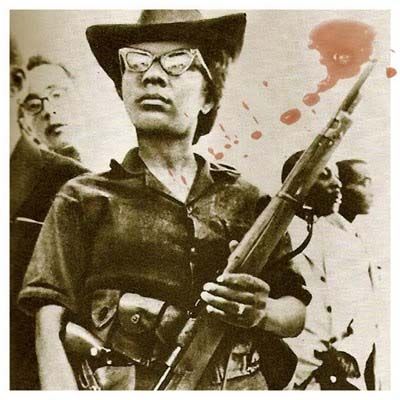
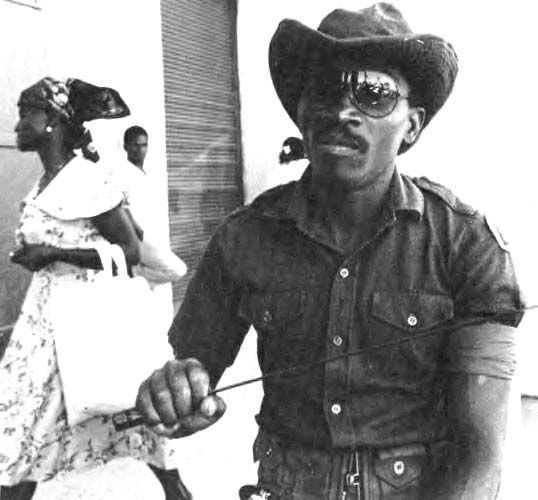
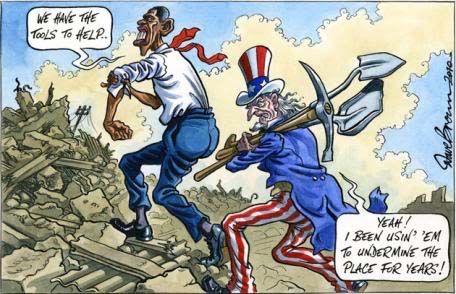

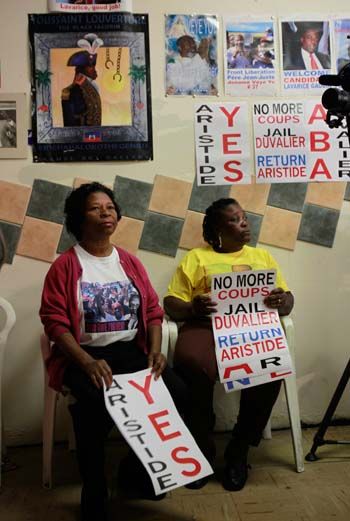
15 comments